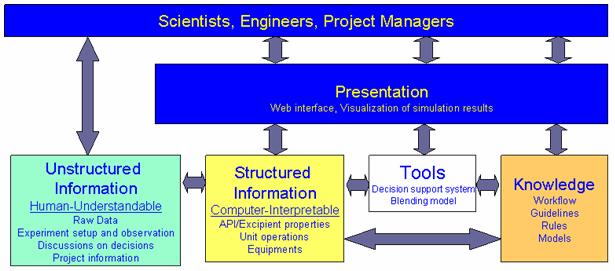You are here: resources › Series › Pharmaceutical Informatics › About
Pharmaceutical Informatics
Category
Published on
Abstract
Pharmaceutical products manufacturing is an important growth area for the US economy. Continued progress in biotechnology and genetic engineering coupled with an aging population will create both new mega-opportunities as well as pose new major challenges in this area, where the products are mostly manufactured using batch process technologies. In this sector, the process of successfully bringing a product discovery to the marketplace - usually in the form of a new molecule or formulation - is a complex, expensive, time consuming, as well as information, knowledge, and computation intensive challenge.
The current industrial practice towards this challenge is sub-optimal and is readily admitted to be such by industrial practitioners. People try to make do with limited computer-based assistance to acquire, manage, and interpret complex product and processing information with enormous amounts of human intervention. This naturally leads to huge inefficiencies, uncertainties, and product quality concerns all along the product pipeline. Hence, the really compelling drivers for the development process are speed to market and getting it right the first time.

In the Laboratory for Intelligent Processing Systems (LIPS), research is focused on the development of an integrated, intelligent, information modeling framework for automating and optimizing the pharma products pipeline. One of the important bottlenecks is the time and effort spent on synthesizing operating procedures. Synthesis of operating procedures involves the systematic generation of step by step instructions which an operator can implement to manage a batch plant safely and optimally. This is a labor- and knowledge-intensive task that often takes weeks of effort by experts to prepare a clear and error-free set of instructions. LIPS has developed an intelligent systems framework in which operating procedures are developed from information about the plant setup, process chemistry and recipe, and product properties and requirements.
The key issues for solving the automation problem are knowledge representation and planning. The knowledge representation strategy handles both the process specific and process general knowledge in a flexible manner that can facilitate easy modification, and also address the discrete event character of batch processes.
Cite this work
Researchers should cite this work as follows: